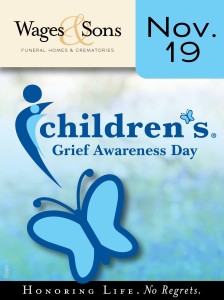The third Thursday in November has been set aside annually as Children’s Grief Awareness Day.
Children also grieve losses, but often are unable to express their feelings as they lack the skills, words, and understanding of what is happening to them. Even when asked how they “feel” about the loss, or if they are “OK”, they have no way to answer those questions. They don’t know how or why they feel as they do.
Helping children grieve well requires an understanding of their various stages of development. What works for a 5 year old is very different than what works for a 10 or 15 year old. As adults, we tend to project onto children our understanding and feelings of loss. Few children can relate to an adult perception of the finality of death and loss.
Those who work with grieving children most often suggest being honest. Allow them to be a part of outward expressions of mourning and the funeral if they wish to participate. Answer their questions as factually but simply as possible. Don’t use ambiguous language….children are very literal; “passed on”, “in a new place”, “went to sleep forever”, “got sick and didn’t get better”, and the like can spark imagined images and fears much worse than the truth.
Help them to accept that death is just as natural a part of life as is birth. Plants die, pets die, people die, but we have our special memories of them with us always.
Very young children need very little detail. As they age, they request more information. By the teen years, they become much more emotionally charged. Signs to watch for include slipping grades, depression, isolating behaviors. You may need to enlist the help of other trusted people such as counsellors, favorite teachers, aunts, uncles, or grandparents to help them talk through the loss.
One of the most difficult things for all children is that they don’t want to feel different than their peers. The death of someone close to them makes them feel like an outsider since many of their peers haven’t experienced such a loss. They can’t share with their friends about it, since the friend hasn’t experienced a loss, making them feel even more different, thus more alone in their grief. Don’t miss an opportunity to be their trusted person if they give you the opportunity. Be an attentive and compassionate listener.
The loss of a pet in particular provides a great opportunity to discuss life and death with a child. They realize the pet isn’t coming back, and they often wish to do some very healthy tasks of mourning associated with the death, such as making a little casket, burying the pet’s remains, and making a marker for their grave. Encourage them to do this, help them with it, and answer all their questions while doing it together.
The moments spent helping a child grieve and grow can also help the adult face their own feelings associated with death and loss. While the adult is teaching the child, the child teaches the adult. In the end, both can reach a place of acceptance and peace.
Loss and the resulting grief touch us all at some time, there is no escaping that. Prepare children well for experiences of loss, and be there lovingly to support them as they make their way through it.
______________________________
Note: some outside resources in the Atlanta area for helping children through loss include:
Rainbows for Children (rainbows.org),
Kate’s Club (katesclub.org),
Camp STARS (vnhs.org)




